September 25, 2025

Gaining new perspectives as we go through our lives
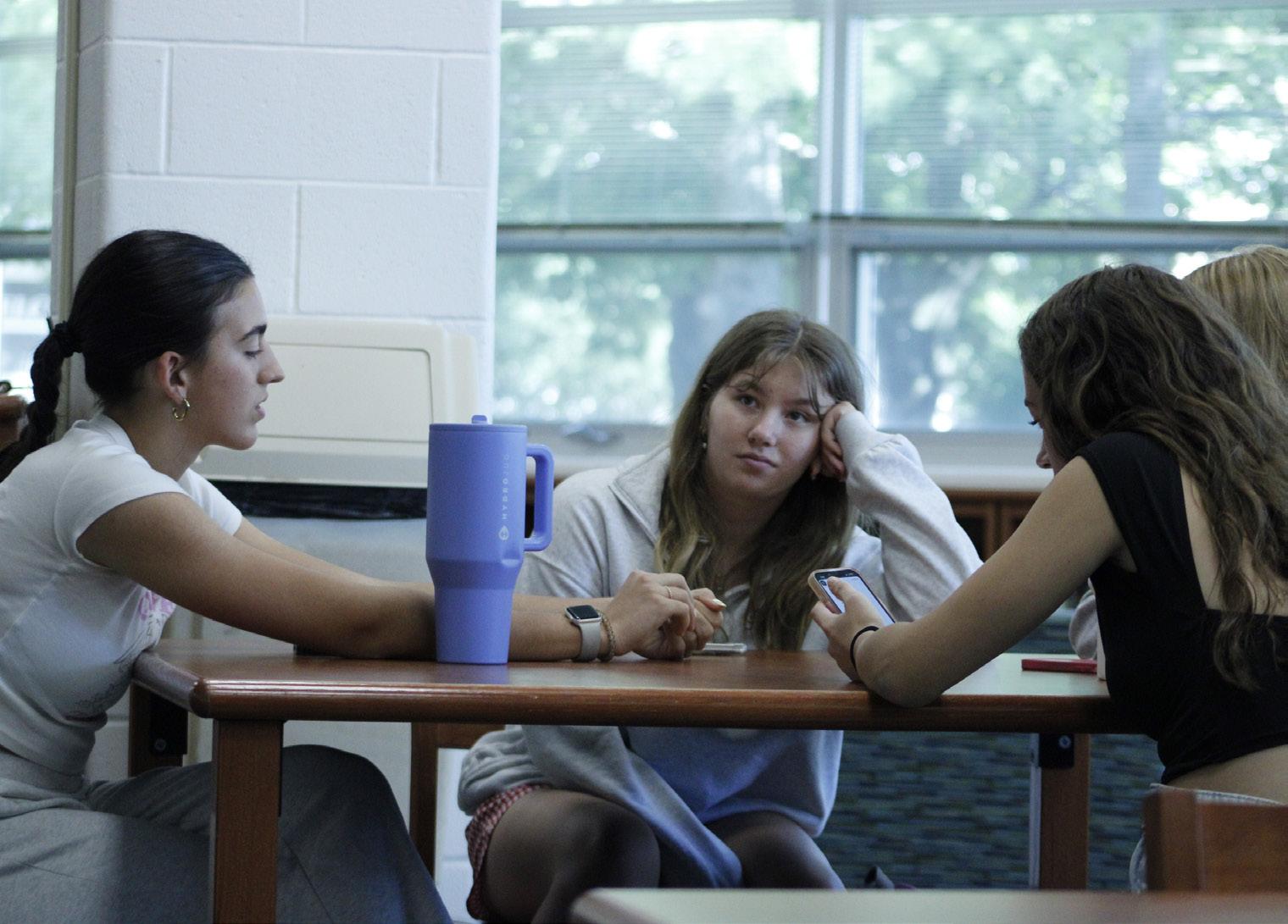
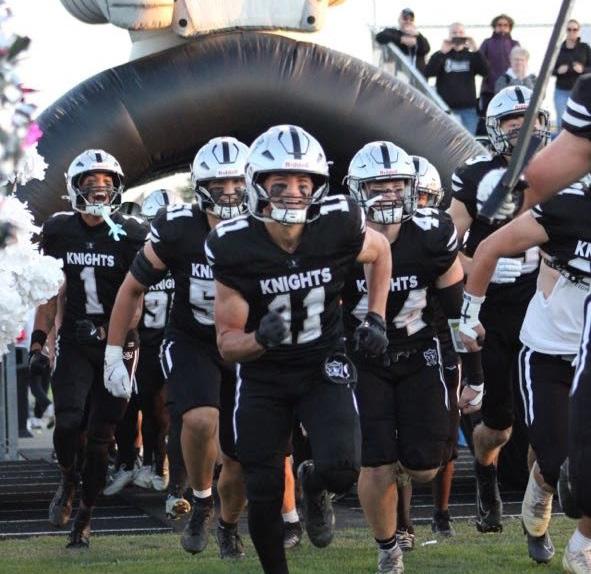








September 25, 2025

Gaining new perspectives as we go through our lives









BY CLARA SAROS Column Manager
While many policies, such as the new parking system, the use of 5-Star, the mandated lanyards and the dumping out of drinks when a student arrives at school late are new this year, some procedures that may feel new are simply being more enforced.
The 5-Star system requires students to scan out of the classroom with their ID for a pass to their destination. The program monitors both the number of passes a student uses each day and how many students are in the hallways at a time. Each student gets five passes per day, and only 15 students can be out of class at any given time.

“The bathroom pass, I feel, is pretty valid,” senior Mylee Crosby said. “Last year, there were a bunch of people that were in there all the time, doing whatever, like 20-minute bathroom breaks.”
The limited time students can spend out of the classroom also increases the amount of time that they will be in the classroom learning.
Another purpose of 5-Star is the point system. This is designed to give points to students for good behavior and attendance at school events. These points are redeemable for different rewards, which include candy, Kaneland gear and discounts on dance tickets or parking passes.
“The biggest thing for me with
5-Star and focusing on tardies is actually to recognize and showcase all the great choices we have students making,” Principal Melinda Cattell said. “We have a lot of students who are making amazing choices and doing great things, and I think they deserve to be recognized.”
Along with the addition of the 5-Star system, Kaneland students have been asked to wear lanyards with their IDs this year. This is a change from past years when students were only required to carry their IDs.
“In terms of just having the ID on them, I think it is very common in a lot of school buildings,” Dean of Students Steven Lucas said.
Lanyards with clearly displayed IDs help security staff ensure that everyone is where they need to be.
“I don’t like the lanyards because I personally can’t keep track of mine,” senior Charlie Nordell said. “I’ve lost mine four times already, but I don’t need it because I can just use my ID [number].”
Despite the administration’s logical intentions, it is hard to ensure that every student wears their lanyard every second of the day. Some students do not wear their lanyard at all, and others even claim to have already lost theirs. Administrators and members of school security have started giving out candy or points on 5-Star to students who are wearing their lanyard in the hallways.
Another change this year is the parking system. Last year, students were assigned a designated parking spot to use each day. This year, students may change where they park, as






long as they stay in the student section of the lot.
“The biggest reason is that we were losing a lot of time and resources as far as our School Resource Officer (SRO) and our dean,” Cattell said. “We were using them in a capacity that is probably not the best use of time. And the fact is that students every single day would park in the wrong spot.”
In short, the system was not working the way it should have been and only caused more chaos. Issues such as car accidents and people parking in the wrong place were not resolved by the previous system.
Another change to encourage students to arrive on time is Cattell or main office staff dumping out students’ purchased drinks if they are late to their first class. This idea has been controversial among students.
“[I] bought the drink, so why should I dump it if I’m late?” senior Gloria Caraus said.
While it can be frustrating from the students’ perspective, Cattell reports that there have been fewer tardies after the implementation of this policy. Teachers have also noticed a positive change in attendance.
“No one has said much in terms of feedback, but in terms of body language, [students] are going to the bathroom quicker, [students] are understanding more in class and [students] are doing more homework in class because [they] do not have those distractions,” math teacher Alyssa Thurman said.
In addition to fewer tardies, phone usage has also been prohibited. Students are no longer allowed to take their phones to the restrooms or into the hallways. This limits the amount of time that students are spending in the halls and prevents distractions. While this was technically a rule last year, it was rarely enforced.
“I do not know what happened previously to me, of course,” Lucas said. “I wasn’t here, but from what I know or what I’ve heard, some things were not enforced as hard as others. I think that’s where the mindset is. ‘Oh, there’s all these new rules,’ but in reality, they’re just being enforced now.”
BY ALEENA ALRIFAEE Editor and Social Media Assistant
thing to do. Regardless of the outcome or who it may affect, the truth is the truth.”

bullying and physical or cyber threats of violence toward the school, an individual or a group. Suspicions of illegal activities can be reported as well. This resource can be accessed by calling
lieves that it is important to speak up if something does not feel right.
“My advice would be, ‘See something, hear something, say something,’” Perkins said. “That’s the responsible
School psychologist Brooke Butcher explained that the hotline is helpful for students who may be hesitant to report directly.
“It’s really the first line of defense,” Butcher said. “If students are fearful of retaliation or don’t want to speak up themselves, this gives them another way to report concerns. Staff and parents can also use it if they overhear something that may put students at risk.”
If a student or anyone in the school community tries to retaliate for reporting bullying or makes a false claim of bullying, they can face serious consequences.
According to the Kaneland website, “Any school community member who retaliates against another for reporting bullying/ harassment, or who knowingly makes a false accusation of
bullying/harassment or retaliation, shall be subject to strong disciplinary action as designated in the handbook.” The site also explains the three levels of bullying, along with examples of each, that the district uses to determine appropriate interventions.
The SpeakUp for Safety tip line is part of Kaneland’s ongoing effort to ensure a safe learning environment. By providing multiple ways to report concerns and protecting those who speak up, the district hopes to prevent threats and promote a safer school community.
BY ANNA GATZ & SAVANA SANCHEZ Editor-in-Chief of Multimedia and Editor and Broadcaster
The United States has been known as a global superpower for over a decade, assuming a peacekeeping role on the world stage. But since the second inauguration of President Donald Trump and his “America First” legislation, U.S. foreign policies have changed.
When compared with other administrations, Trump’s view of tariffs shifts from their traditional use. Tariffs are taxes on imported goods. Everyday goods are subject to tariffs: clothes, electronics, cars and even food. Trump, in his effort to deliver on his campaign promise to lower taxes, has used tariffs to subsidize the loss of revenue.
“The tariffs and the constant on again off again have created an economic unease among people in the United States,” social studies teacher Jessica McNally said. “A lot of countries have re-thought their alliances with the United States during this time. We do risk losing some of our best allies.”
Currently, Trump has threatened rates as high as 200%. However, many of these tariffs are just that: threats. The term TACO (“Trump Always Chickens Out¨) was first used by the Financial Times to describe Trump’s tariff policies. On many occasions, he has threatened a tariff only to reverse or delay the decision before the tariff was enforced.
According to Reuters, Prime Minister Anthony Albanese of Australia said “the [Trump] administration’s tariffs have no basis in logic, and they go against the basis of our two nations’ partnership.”
And while tariffs have been a staple of Trump’s current policies, the peace keeping goals of the U.S. have led to efforts to end Russia’s war in Ukraine and Israel’s war in Gaza.
Despite his campaign promis es, Trump has been unable to broker a lasting ceasefire and end the ongoing hu manitarian crisis in Gaza. National and worldwide pressure to end the war has led top White House officials to make plans for post-war
Gaza and put pressure on Israel to stop the fighting.
According to Al Jazeera, Trump has gone as far as to suggest the United States “take-over” and “own” Gaza and relocate the Palestinians, but he faced international backlash for the comment.
While he has focused on getting food into Gaza, Trump told reporters, “As far as the rest of it, I really can’t say. That’s going to be pretty much up to Israel.”
Trump’s policies have made headlines internationally, with many people worried about what his decisions mean for them.
“I personally love to travel,” McNally said. “I don’t want to go somewhere and be embarrassed to be an American and feel like people in different countries are looking down on Americans.”
McNally’s fears have become a reality for some Americans abroad.
Senior Syarah Schatz is spending the year studying in Germany and has observed what Germans tend to think about life in America.
“Germans think America is in a really bad state right now,” Schatz said.
Not only might U.S. actions on the world stage worry citizens, but so too can words expressed in public settings.
“Germans felt very hurt when Elon Musk supported the Alternative for Germany (AfD) party,” Schatz said. “It feels like it’s repeating history a little bit.”
According to research from National Public Radio (NPR), AfD is Germany’s ultra-right political party that is current
AfD rally in January, indicating that Germans need to “move beyond” their troubled history.
During his time in the administration, Musk cut crucial programs for immigrants in America, including legal services for unaccompanied children, refugee and entrant assistance, and the U.S. Citizenship and Immigration Services (USCIS) grant program.
Senior Arianna Rudey, a daughter of Moldovan and Ukrainian immigrants, noted that “it’s so different when you grow up in America because you’re so used to all the rules and you’re used to everything. But to immigrants, it’s so completely different because you’re not used to American rules. You’re not used to any of that.”
Cultural differences also change how non-Americans perceive the U.S. Discerning whether social media platforms and politicians accurately depict a country’s identity can be a struggle.
“Germans think Americans are loud, definitely. Lazy, fast-food loving,” Schatz said, before adding the common German thought that Americans are “obsessed with McDonald’s.”
Outsiders are not only noticing cultural differences, but also different approaches to diplomacy and global politics.
Recently, Trump met with Russian President Vladimir Putin to discuss the potential for a Russia-Ukraine ceasefire. The three-year-old conflict has reached a death toll of over 1 million people with no peace deal in place.

“I know my mom is panicking,” Rud -
Leading up to his presidency, Trump he would end the war in within his first 30 days in office. In his first month, he temporarily froze military support to Ukraine.
In February, Trump and Ukrainian President Volodymyr Zelenskyy met to discuss the challenges Ukraine was facing, but the meeting ended with heated words and little progress. In August, Trump met with Putin in Alaska to continue negotiations, notably excluding Zelenskyy. No peace agreement was met, leading Trump’s promise of a ceasefire to fall short.
BY KATE HOMCO Editor and Podcaster
Weeks before students gather under the disco lights at the homecoming dance, members of Student Council work hard to make it a memorable week for everyone.
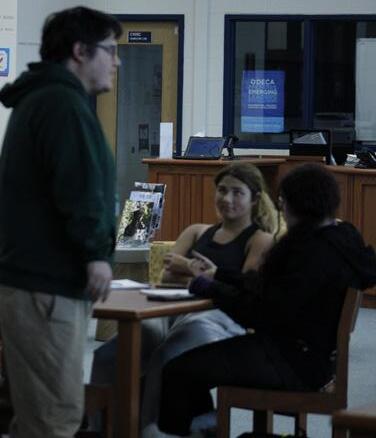
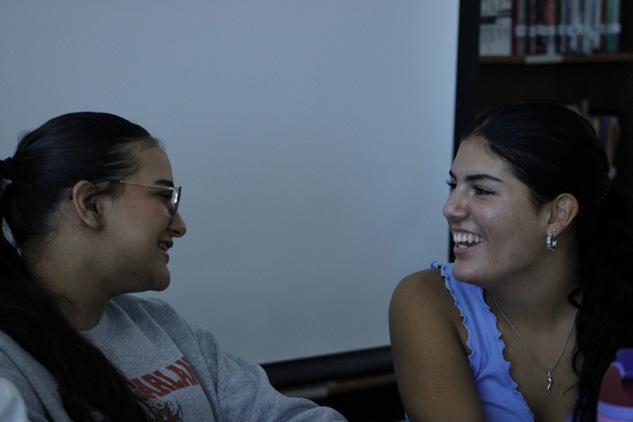

Student Council members are faced with many tasks to plan and oversee: the parade, the powder puff game, the assembly, the theme and, of course, the dance. Each of these tasks are more difficult to plan than one may think.
“We start weeks beforehand on our end,” said Daniel Ponczek, one of two new Student Council advisers.
First-year Kaneland teacher JP Quirk is also new to Student Council advising.
One of the advisers’ responsibilities is to have everything in place after the students determine their own plans. One example is assuring that the parade
route is booked and able to run smoothly. Advisers must also make sure that the students pick an appropriate theme.
Advisers are not the only ones who have important responsibilities. Student Council members have a lot on their plate as well. They must advertise the events, especially the dance, to ensure good attendance. The Student Council wants students to attend not only to make back the money they spent on the dance, but to put together a fun night.
Choosing the homecoming theme
may seem simple, but Student Council members could have a different story.
“The theme and spirit week are our most challenging decisions, as well as the assembly,” junior and Student Council president Grace Collins said.
Collins has one of the most important positions and the final say in Student Council decisions.
The members of the club come up with several ideas before choosing the one that best aligns with their plans. They make sure the theme can be applied to a week full of spirit days. The hallway and dance decorations must also relate to that theme.
“It is also important that the theme is unique, not similar to something we have done for recent dances, and it must be relevant,” junior Student Council member Chloe Sullivan said.
While it may just seem like a fun week with a dance to most, the members of Student Council know that homecoming week is one of the most stressful times of the year. Despite all the challenges, the Student Council always tries to make the week of homecoming unforgettable.
BY CHARLIZE LANDA Co-Copy Editor and Broadcast Manager
High school sports serve as a way to develop your abilities and potentially attract college offers. Clubs like ACES or DECA allow you to show off your intellect, plus they look amazing on a college application. Finding the right group for you can help you follow other passions.
Clubs can offer students a sanctuary to interact with people who have similar values and interests. Junior Kyla Schulz joined Student Impact after hearing about the club from her older brother. Ever since her freshman year, Schulz has been an active member of the student-led Student Impact club and works diligently to spread the gospel to students.
“Normally we break off and read a passage in the Bible, sometimes highlighting verses,” Schulz said. “We then reunite and share if someone wants to and end the meeting in a prayer.”
their group, even if they do not have a previous relationship with God. They are allowed to express their feelings, share their experiences and even question their faith.
Student Impact meets every week on Wednesday after school and has events throughout the year, like community outreaches and holiday celebrations.

that




Student Impact members emphasize that anyone can become a part of

allow students to express their authentic selves, like the Gender Sexuality Awareness Club (GSA). GSA is a student-led club that meets after school every Tuesday, and it offers queer students and allies a place to connect and express themselves. Art teacher Emily VanDelinder-Birchfield is in her first year as the GSA adviser.
“I’m excited to work with and give folks a space to be and feel safe or feel welcome,” VanDelinder-Birchfield said.
VanDelinder-Birchfield applied to be the GSA adviser because her experience in the roller derby community allowed her to meet a diverse group of people.
“Hearing their experiences and what would be good or supportive was something I was listening to,” VanDelinder-Birchfield said.
She believes that having a safe space for LGBTQ+ members to be themselves is important.
Whether you want to spread a message or find a place to feel secure, Kaneland has a club for you with dedicated members.
BY GRACE BRUNSCHEEN Editor and Columnist
Most athletes spend hundreds of hours practicing to improve their abilities. They learn new skills, whether it’s a new move to beat their defender or something the opposing team could never see coming. But what is often left unspoken are the unseen life skills that athletes learn and carry with them beyond sports.
In sports, teamwork must be learned early for a player to have success. It’s hard to meet a coach’s expectations when everyone’s playing for themselves.
While teamwork might seem like a basic lesson, it builds communication, trust and shared understanding on the field or court.
“Teamwork is very important,” sophomore and junior varsity soccer player Matthew Crabb said. “If your team has good teamwork, it’s easier to talk to them, make suggestions and know how they’ll play the game.”
But not all sports rely on group dynamics. In individual sports like tennis, the challenges and lessons can look different.
One person who knows this well is Beth Miller, the girls varsity tennis coach. Miller has been coaching at Kaneland for the past seven years. Miller devel oped her love for the game of tennis at just five years old.
Over the years, Mill er has worked to instill a balance of skill development and mental resilience in her play ers. She believes that the mental aspects of tennis are
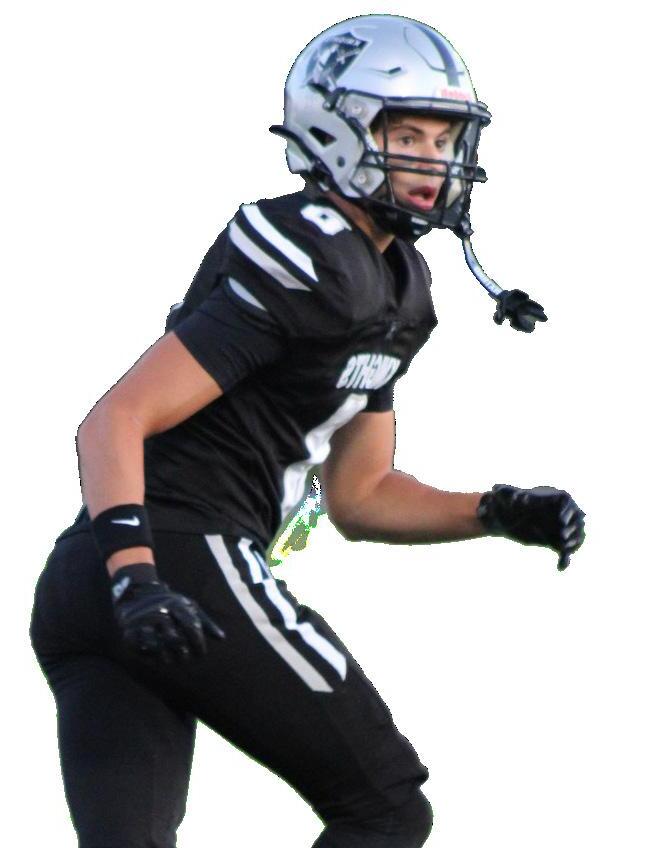
just as important as the physical side.
“In singles, they have to be able to rely on themselves and talk themselves up when they get down into a rut, because they’re out there on their own,” Miller said.
Whether athletes compete on a team or by themselves, one challenge they share is learning how to balance their sport with everything else in life, especially school. With travel, practices, games or meets, it can be tough to stay on top of homework, projects and studying. That’s why time management becomes a crucial lesson to understand, one that many student-athletes have to learn early on.
Athletes have to find ways to make time for a variety of activities each day. It can be hard to focus on improving and having fun in a sport when all you can think about is the homework you have to do after school. But finding ways to manage that stress can be relieving.
“I sometimes struggle with time management,” freshman volleyball player Eliza Bruhl said. “If I have a lot of homework and practice after school, things start to pile up for me, so I try to get the things I need to get done in one day.”
Bruhl and many other athletes have experienced this challenge. With limited hours in the day, student-athletes are
often under pressure to perform in both the classroom and on the field or court. This pressure can be intense, but it also teaches athletes how to face it and to find different ways to navigate through it.
Because sports require a level of dedication that goes beyond what many people see from the sidelines, student-athletes have high expectations from many people, including themselves. The pressure from all directions can be overwhelming, making it hard for athletes to enjoy the sport they love.
Despite the pressure, many student-athletes find ways to push through those challenges by relying on discipline, routine and support from teammates and coaches. Staying organized, setting priorities and asking for help are keys to staying on top of it all. Even without a perfect balance, the effort that athletes put in to manage everything helps them grow stronger.
“I believe that many athletes put way too much pressure on themselves, focusing on their faults rather than their progress and what they’re doing right,” Miller said.
Sports offer life lessons, from dealing with stress to working as a team. These lessons last far beyond the season. In the end, there is more to sports than the final score and trophies.
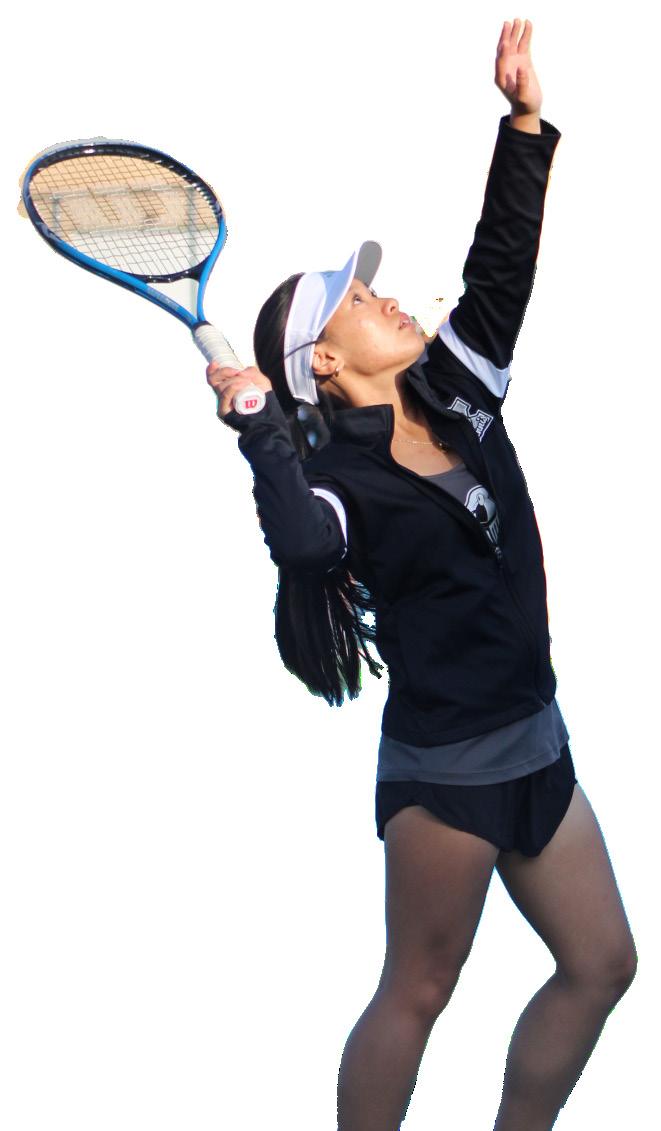
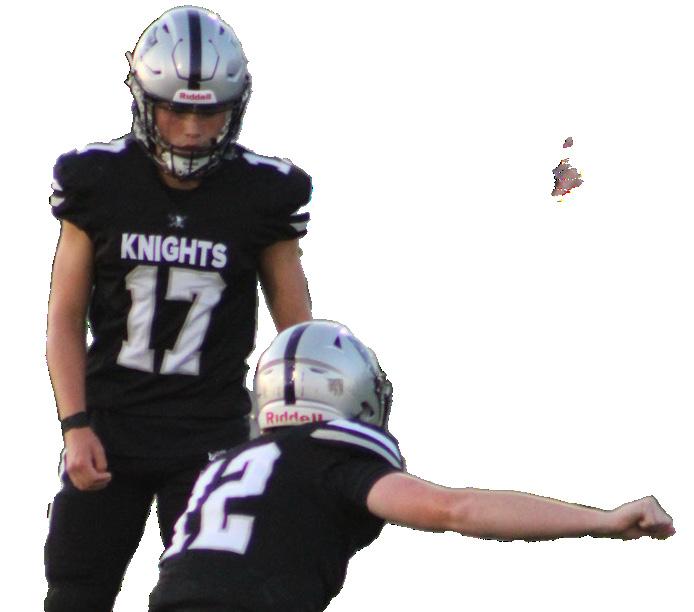



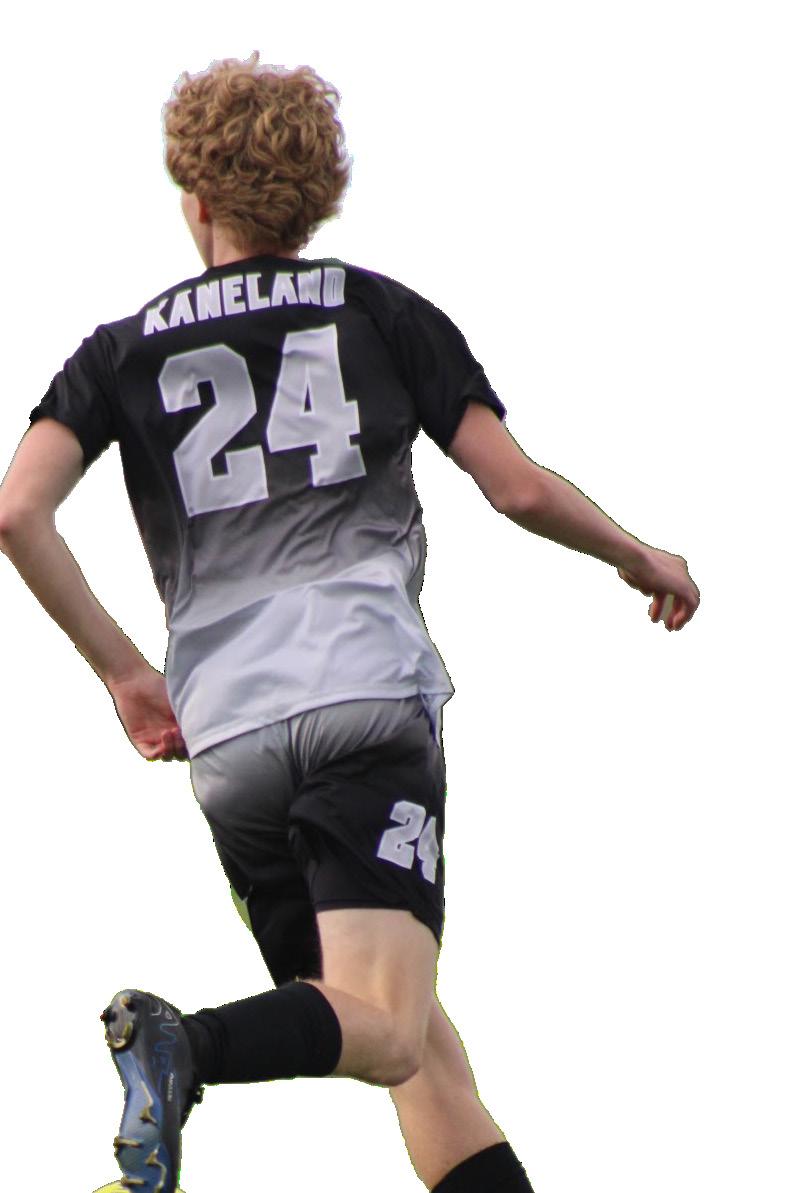
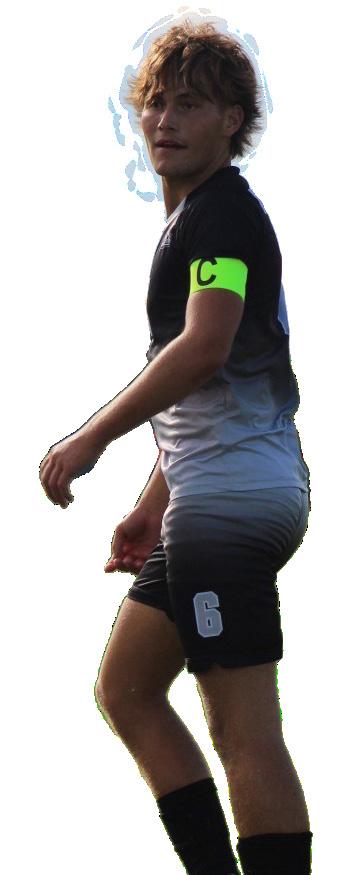
For many teenagers, social media is an essential outlet for self-expression. While this can take the form of posts about relationships or hobbies, according to the Pew Research Center, it has also turned into a platform for 59% of teenagers to express grievances about politics or a lack of social justice.
Since it may appear to some that there are a limited number of changes a student can make within their community, it is natural that they turn to social media to voice their opinions. Students may be inspired by large social media movements that received national attention, like Black Lives Matter to tackle police brutality and #MeToo to address sexual abuse. With these successes, people are optimistic about their own online impact.
“Social media can be a megaphone, and I want to use my voice for important issues that are overlooked,” junior Laney Cattero said.
Cattero knows that online activism can help spread the messages she would like others to hear. Although an Instagram story may not change the world, it is great for informing peo ple about what is going on, an important first step in making a difference. Easy to read infographics and short posts about breaking news can make complicated situations more digestible.
tional action outside of the post is not how change is generally brought about.
“Simply posting on social media doesn’t and won’t solve a complex social justice issue, but I also believe that it’s a good tool for education and connection,” Cattero said.
More concerns about online activism include the possibility that people may only be making these posts for public attention, rather than for genuine compassion for social justice. These individuals, often celebrities or influenc -
ers, will post without taking any action for the cause and make the movement into a trend. This pressure to post without truly thinking about the content may lead to the spread of misinformation as well, which has the potential to harm a movement. The feeling of being expected to repost about certain issues may lead people to feel overwhelmed by information and guilty for not posting, so instead they post because they feel obligated to, not because they truly care.
At Kaneland, a club focused on taking action related to social issues is the Science and Environmental Impact Club. They focus on spreading awareness and making the school more environmentally friendly. Senior co-presidents Trevor Pabian and Sarah Syed create lessons and activities to advance this effort.
“The biggest thing we did was plant a tree on our school’s campus,” Pabian said.
Any method of trying to inspire change could prove difficult, but it is vital to persevere through hardship. Cattero receives criticism from peers about her political opinions and posts, while Pabian has to convince teachers and administrators to support his attempts at improving the school.
“I feel like posting on so cial media is just like a drop in the ocean, but I keep sharing hoping to create a wave,” Cattero said.
The University of Sussex points out that online activism gives marginalized groups a voice, increases access to infor mation and has brought about tangible change in certain instances. For exam ple, the Black Lives Matter movement led to the introduction of some police reforms and police officers who committed violent, racist attacks being held account able. These reforms be gan with online posts, then flourished into physical protests and then led to actual change. The Uni versity of Sussex does point out, however, that posting with out any addi

“You need to keep bothering administrators over and over for them to actually listen,” Pabian said. “Don’t just email them. Following up in person is a great way to get the idea into their head.”
Participating in online activism is still beneficial in its ability to spread awareness and educate people, but combining it with physical activism will create the most change.
“The steps that I take outside of social media to support causes is having open-minded conversations with other people,” Cattero said. “I make lifestyle changes to help the environment, but I mainly use my art to provide messages
While it might not be possible for one person to change an entire societal or political issue on their own, it is possible for anyone, even teens, to be a piece in the puzzle of educating and shaping their communities.


“Don’t just talk about change; try to be the change,” Cattero said. “Learn as much as you can about issues, and have conversations with people in your com -
BY OLIVIA COTTER

Co-Copy Editor and Production Executive
To you, it might be as mundane as sending a prompt to ChatGPT or using an AI filter on TikTok, but what happens when our society starts to view AI not as a tool, but as a necessity?
Scientists have been developing Artificial Intelligence since the 1950s, but major breakthroughs have been made in the last few years. The most popular AI program, ChatGPT, was released in 2022 by OpenAI. ChatGPT was built using a language model called generative pre-trained transformer (GPT), meaning that it was trained on text data. Users could input a prompt and ChatGPT would respond by following a pattern of predictable words. It also relies on the user to lead the conversation and will reply with what it thinks the user wants to hear. This new technology has been adopted in all sectors of our economy: customer service, manufacturing, logis tics, marketing and even healthcare.
As healthcare and insurance pric es rise and people all over the world are seeking counseling, AI companies have found a new use for their technology: AI therapists. AI therapists are available through text and sometimes over the phone. According to heynoah.ai, an AI emotional coaching app, “Noah isn’t just technology - it’s your personal, always-there guide trained by top therapists.”
AI therapy apps advertise themselves as accessible and helpful tools for those struggling with their mental health, but unlike traditional forms of therapy, there are no ethics committees or licensing to oversee them. In fact, Illinois Governor JB Pritz ker recently signed legislation restrict ing AI usage in therapy.
of Financial and Professional Regulation (IDFPR) Secretary Mario Treto Jr. said in a press release.
Not only is AI widely unregulated, it is also addictive.
“Social media, AI and phone companies use what we call operant conditioning and schedules of reinforcement to make you addicted to your phone, and it’s actually as addicting as heroin,” AP Psychology teacher Daniel Ferrel said.
Operant conditioning occurs when a behavior is strengthened or weakened by consequences. For example, your AI sending you a funny message or a compliment will encourage you to continue to engage with it. AI companies take advantage of this to keep you on their app or website, or they even compel you to buy a subscription. This could be problematic in regards to AI therapy, as it is in
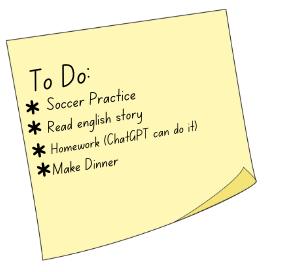


“This legislation stands as our com mitment to safeguarding the well-be ing of our residents by ensuring that mental health services are delivered by trained experts who prioritize patient care above all else,” Illinois Department



BY AUDREY NORING Editor and Social Media
Assistant
There’s more to the story behind his teacher badge. JP Quirk isn’t the stereotypical English teacher. He didn’t start teaching until he was in his 30s. He has traveled the world, been a professional actor, earned his cosmetology license and was born in Ireland. He brings a new dynamic to Kaneland High School.
“I get to bring a lot of really cool life experiences that I did before teaching into the classroom,” Quirk said.
Along with his life experiences, he brings kindness, energy and passion into everything he does.
“I feel like I’m a huge ball of energy and colors wrapped in a lot of stress and self-doubt,” Quirk said.
Quirk embraces all parts of himself, refusing to hide his emotions from his students.
“I’m a teacher and an adult, but I still have bad days,” Quirk said. “I’m sad, or a lot of the time confused.”
Bringing all of his emotions to the table helps students relate and feel less alone. It gives students a reminder that everyone is allowed to express their feelings.
“I think that makes me a really good teacher,” Quirk said. “I don’t come to work and pretend.”
Just as open as he is with his emotions, he is open about his sexual orientation. He lets students figure that out for themselves.
“If you were to ask me, ‘Hey, do you have a wife?’ I would say no,” Quirk said. “If you were asking, ‘Do you have a husband?’ I would say, ‘Absolutely.’ I’m like, ‘What is the answer you want to get?’ You need to ask the right questions.”
He doesn’t lead by telling his students he has a husband. Similarly, a straight female teacher’s main identity isn’t usually their significant other. He believes his sexuality is just a fact about himself, not his whole identity.
“I don’t think [my sexuality] is the most important thing about me,” Quirk said.
Quirk has been married for nine years. He and his husband, Jason Hardman-Quirk, met after one of Quirk’s shows and soon began hanging out together. They like to try new restaurants, go to T.J. Maxx, buy things they don’t need and watch live performances.
Quirk has also built a career on
stage and screen. He appeared in various movie and TV show productions, including Divergent, Chicago P.D., Wicked, Batman v. Superman and a national production of Romeo and Juliet. He has been involved in over 100 stage productions.
Of all his stage productions, one stood out to him the most. He directed a TV production of the Columbine High School shooting. The production retold the Columbine tragedy through the eyes of high school students, a perspective Quirk found deeply moving.
After Quirk did a TV commercial in late elementary school, he found his love for performing. He was involved in middle school plays, and he eventually climbed his way to a higher level. Quirk attended Larkin High School Visual and Performing Arts Academy in Elgin. That’s where he performed and really found who he was as a person.
“I feel like I’m a huge ball of energy and colors wrapped in a lot of stress and selfdoubt.”
- JP Quirk
Quirk still loved acting, but in 2017, he was looking for another fulfillment. One day, the idea dawned on him to become an English teacher because of his love for analyzing literature. He went to school to get his second degree in English education when he was in his late thirties.
Quirk came to Kaneland looking for a fresh start and a change. He had been teaching English at South Elgin High School. Before that, he taught at Kenyon Woods Middle School in South Elgin.
“He seems really happy at Kaneland,” Hardman-Quirk said. “I know it was a big shift from his last school, but he comes home happy and talks about it a lot.”
Despite this being his first year at Kaneland, Quirk is wasting no time getting involved. He is one of the Student Council advisers this year. He also works well with his new coworkers to understand everything there is to know about
the English classes he’s teaching.
“I’ve only known him for a few weeks, but I definitely think he’s like an energizer bunny at all the team meetings,” English teacher Rachel Giles-Bachman said. “He’s really good at asking questions and wanting to understand the curriculum.”
Quirk has taken a step back from acting, but he is still involved in the performance world. He performs and directs on the weekends at the Albright Community Theatre in Batavia. The Albright produces about five shows a season.
“A lot of kids ask me, ‘Why are you teaching? You were famous!’” Quirk said. “I’m like, ‘What defines fame?’”
Quirk never regrets choosing the teaching profession. In fact, he found that teaching was his calling.
“I instantly realized teaching was exactly what I needed to do,” Quirk said. Quirk is good at bringing his diversity and life experiences into his classroom. He is engaging, energetic and extremely passionate about the things he loves.
“He’s probably one of the most authentic people I know,” Hardman-Quirk said. “He wears his heart on his sleeve. He really loves people and he loves them hard, whether it’s his students, his friends or people he’s performing with. There’s something really awesome about watching him work and watching how excited and passionate he is.”
Additionally, his relentlessly supportive nature is an important part of his relationships.
“He was there with me when my mom passed away,” Hardman-Quirk said. “He was really good at being there. He never wavered. If he needs to be there for someone, he is there for them 110%.”
Quirk’s positivity and kindness extend beyond the classroom into his everyday life.
“He looks at the world through a brighter lens than most people,” Hardman-Quirk said.
In the classroom, that light is something students get to see every day.
His passion and kindness now flow through the halls of Kaneland. It is proof that sometimes the most unexpected journeys lead someone exactly where they’re meant to go.

BY PREMA WEICHUN Editor and Social Media Assistant
There are 1146 students enrolled in Kaneland High School. Each student has an individual story. Every student has a home life and a school life. Every interaction that each student


question their actions. A person’s actions can be a reflection of other things going on in their non-school life. Realizing that we all have similar fears and struggles can help us feel less alone.
Throughout senior Xander Figueroa’s four years at Kaneland, he has observed changes involving himself, other people and how he treats
about something, it can be helpful to note that there are millions of others going through the same thing. For example, there may be a student in your class who didn’t complete his study guide and is petrified that he is going to fail an upcoming test. There are so many other students who feel the same way. Looking from this perspective can be a comforting reminder that nothing is as
“It was comforting to take a step back and realize that I wasn’t the only person feeling that way.”
- Ava Kraus
Adjusting our actions by looking at them from others’ perspectives can allow us to see the bigger picture and hidden struggles that everyone is deal ing with. It can put things in perspective and evoke the realization that now is not

High school is one of the most sig nificant periods in a person’s life. It is filled with stress, changes and challeng es that can be mental, physical and so cial. Everyone who sets foot into school has other struggles that we likely do not know about. Balancing school on top of personal struggles can be a challenge for many, especially when they are

dealing with, it’s important to make them feel like they’re not different from everyone else,” Figueroa said. “We’re all just humans going through our own

Gaining perspective can be helpful for problems are permanent. When someone is acting dis tant or dif ferent from someone else, a person’s immedi ate reaction may be to criticize them or

The majority of people have gone through something that they were extremely nervous about. In hindsight, the moment generally passes and is rarely permanent. There are many scary moments involved in growing up, but we don’t have to go through them alone.
Ava Kraus is a sophomore who has been a part of the cheer program for the past two years. She is friendly and always tries to relate to other people.
“You can’t body’s walked - Emily

through. It is important to rec ognize that there are billions of other people with complete ly different lives and perspectives; no one is alone. “It makes people want to be around you more if you can un derstand somebody’s perspec tive and what people are going through,” Figueroa said. “Doing this makes me feel better because I feel like I can understand anyone and be someone for people to talk to.”



Even when people get nervous
“Cheer tryouts were pretty nerve-racking for me because I didn’t know what team I would make, and I wanted to make sure I was with my friends,” Kraus said. “It ended up being good, and I learned that the whole team was pretty nervous. It was comforting to take a step back and realize that I wasn’t the only person feeling that way.” She was nervous leading into cheer tryouts, but it wasn’t as big of a deal as she initially thought. It was helpful for her to see from other people’s perspectives and realize she wasn’t

Last year, when Kraus was a freshman, she had completely different views on high school, just as any incoming freshman would. A big school with new people and teachers can be intimidating, but as Kraus has experienced all of the things she was nervous for, she realized that it wasn’t as scary as it seemed.
“Once I actually talked to the peo -
ple I was intimidated by, I felt silly for even being scared,” Kraus said. “I realized that I wasn’t alone in being nervous for things, and this even helped me be a friend to the people I was scared of.”
OTHERS’ PERSPECTIVES


With so many people and different life stories surrounding us, it is impossible to truly relate to everyone. The interactions we take part in have the potential to change someone’s mood every minute of every day. The least we can do is be open to different people and try to see where they are coming from.
“You can’t understand somebody’s problem until you’ve walked in their shoes,” high school social worker Emily Skonieczny said. “We can think and sympathize and do everything we can to try and understand, but until you have lived that experience, you truly don’t know.”
Skonieczny has an office at our school where she welcomes students to talk to her about anything. Being a school social worker has allowed her to see a variety of perspectives on a daily basis. She said that her observations have helped her become a better person and friend, as well as allowed her to empathize with what others are going through.
situations from different points of view helps her worry less.
“Since everyone’s so focused on themselves, it is difficult to understand other people’s situations,” Fisher said. “If you really get out of your own head and apply what other people are going through, it would be easier to understand where everybody’s coming from.”

like the end of the world. Acknowledging others’ problems and situations can open a new world of possibilities. When we recognize the struggles that other people are having, we can realize how our problems may not be as bad as we think.



We all carry our own baggage, and sometimes it can feel consuming. Escaping our tunnel vision and seeing the world from others’ eyes has helped Fisher realize that everyone is going through similar problems, and she is not alone.
”Looking at others’ perspectives makes me feel more

When we try to understand someone else’s point of view, we can see the hidden struggles that they may be dealing with. One of the most important things in life is to be kind to everyone, regardless of prior feelings towards them.
comforting to and realthe only way.”
“[The biggest thing] is this sense of compassion,” Skonieczny said. “When I’m working with my students, I see them the whole school day. Then [they] go home and live an entirely different life outside of these doors, and it is still my job to be here the next day so they know [they] feel safe and supported.”


Having a sense of compassion helps Skonieczny excel at her job. She has to always be there for students and constantly think from their perspective about what is best for them.
Senior Megan Fisher has also practiced looking at things from others’ perspectives. She finds that looking at
“You can’t understand somebody’s problem until you’ve walked in their shoes.”
- Emily Skonieczny

understanding,” Fisher said. “Understanding others helps me feel less alone and not as caught up in my own head.”
Dealing with our problems can feel
“It’s important to understand that everyone has different issues, and we need to be open-minded on how people are feeling and handling themselves,” Figueroa said.
Everyone has their own stories and backgrounds. The words that we say can affect people, even in ways that we didn’t think were possible. No one truly knows what someone else is going through or how their thoughts reflect on their actions. Being compassionate towards others and trying to understand them is essential when trying to see the bigger picture.
BY NOAH WITZ Editor and Photographer
In a world where late nights and early mornings often collide, energy drinks have become a go-to fuel source for students, athletes and busy professionals alike. Although all energy drinks serve the same purpose, not all energy drinks are created equal. Between bold flavors, sugar-free options and varying caffeine levels, the experience ranges from pleasantly energizing to overwhelming. Here’s my breakdown of some of the most popular brands on the shelves.
Monster: The Flavor Powerhouse Monster Energy remains one of the most versatile energy drinks on the market. It is known for its growing lineup of flavors, each with a reliable kick of energy. With 160mg of caffeine in their standard 16oz can, Monster provides a steady boost of energy without being overpowering. The company has also leaned heavily into zero-sugar options. This makes it appealing to more health-conscious consumers who still
want a bold taste.
Pacific Punch from the Juice line balances sweetness and tang, without flooding my brain with flavors. It is a nice, smooth option for a morning pickme-up. For those who want options, Monster’s variety is nearly unmatched in the industry.
Red Bull: The Classic Red Bull may not dominate the field with various flavors, but it remains a classic for two big reasons: portion size and marketing. The smaller 8.4oz can is the ideal size for people who want a more manageable dose of caffeine with 80mg per can. Red Bull also offers sugar-free options, though the flavor variety is limited compared to competitors. Despite this, its seasonal flavors often dominate the market. The 2023 Winter Edition Fig Apple was my favorite by a long shot. It contains a smooth apple taste with the subtle fig sweetness. The boost is modest compared to higher caliber drinks, but sometimes less is
more.
Celsius: A Miss Marketed as a “fitness drink,” Celsius has gained wide-spread popularity, but it doesn’t live up to the hype for me. At 200mg of caffeine for each 12oz can, it’s potent while the flavors are often disappointing. The price point feels steep for the small size. I appreciate the quality and quantity over style, but Celsius feels like an overpriced fad.
The Verdict:
With energy drinks, personal preference is everything. Monster offers variety and balance, making it a reliable everyday option, and Red Bull keeps things simple and convenient. On the flip side, Celsius’s marketing identity makes them less appealing for those who value taste and comfort as much as caffeine content. Energy in a can may be easy to grab, but finding the right one is about knowing your limits and favorite flavors. My favorite brand and flavor is Monster Energy’s Pacific Punch.
BY OLIVIA KRASUSKI
Editor-in-Chief of Web
Starting a serious conversation with a friend isn’t always easy. Maybe you need to share something personal you’ve been holding onto, or a friend opens up about an issue and you’re not sure how to respond. Sensitive moments like these can feel awkward, but they don’t have to push friends apart. With the right approach, they can strengthen trust and bring you closer together.
Before jumping right into a serious conversation, it helps to think about the setting and timing. Choose a moment when you and your friend aren’t rushed or distracted, like during a walk, a car ride or hanging out somewhere private. That way, you both have space to talk openly. When you start the conversation, try using “I” statements, such as, “I’ve been feeling stressed lately,” instead of, “You make me feel stressed.” This keeps the focus on your feelings rather than sounding like blame, which makes your friend more likely to listen. When a friend opens up to you, the most important thing you can do is listen. You don’t always need to jump
in with advice or try to fix the problem right away. Sometimes, just showing that you care is enough. Simple phrases like, “That sounds really difficult,” or, “I’m glad you told me,” can make your friend feel understood. If you’re not sure what to say, it’s okay to admit that. You can try saying, “I don’t exactly know what to say, but I’m here for you.” And if the issue feels bigger than what you can handle, gently encourage them to reach out to a trusted adult or counselor for extra support.
Even with good intentions, it’s easy to make mistakes during sensitive conversations. One of the biggest is minimizing what your friend shares by saying things like, “It’s not that bad,” or, “You’ll get over it.” Comments like these can feel dismis -

sive, even if you mean well. Another thing you should avoid is turning the focus back on yourself instead of letting your friend have the space to talk. Avoid gossiping about what they told you, too. Establishing confidentiality builds trust. If you’re not sure what to say, it’s better to be honest and supportive than to fill the silence with the wrong words. Having hard conversations with friends isn’t always comfortable, but it’s often worth it. When you take the time to prepare, listen with empathy and avoid common missteps, you show your friend that they can count on you. Opening up and responding with care doesn’t just solve problems in the moment; it builds a foundation of trust that makes the friendship stronger in the long run. Even if the words don’t come out perfectly, what matters most is showing up and being willing to listen.

One of the six fundamental human needs for survival is certainty – a key piece in the puzzle as to why we as people tend to hold on to the past and dislike change. Holding on to the past, though, has grave implications on both the pres ent and the future. The stabil ity we cling to is a lot more comfortable than opening ourselves up to growth, however having an open mind will result in peace about your past.

Being stuck in our old ways can mean a lot of different things for a lot of different people. Some cannot let go of a habit they know is not good for them, while others cannot let go of a person who is hurting them. Sitting complacent in these situations will only lead to more hurt. Focusing too much on what has already happened takes away from our limited time and energy and forces us to stress about situations we cannot change. This can lead to self-sabotage, such as in relationships, which can manifest into bringing up conflicts that have already been resolved. This pattern can create a serious strain and prevent healing for both parties, leading to potentially detrimental effects on the relationship.
On top of that, clinging to past trauma can have physical and mental health effects as well. The activation of the amygdala and stress hormones as a result can create feelings of sadness, irritability and numbness. It may also cause headaches, stomach problems and nausea.
This mindset doesn’t just take away from our ability to enjoy the present, but it also inhibits our opportunities to grow and change. You are unable to embrace new perspectives and experi -

ences if you do not open your mind to new ideas. Additionally, a rigid mind may distort the way you view the present, preventing you from making clear and informed decisions that can also change future experiences. Focusing on the past may blind someone from the path ahead of them. Having strong regrets about your past will hold you back from growing from it. Without acknowledging the mistakes you have made in the past, it is impossible to fully reflect and, in turn, learn from them.
Fully acknowledging and accepting your past can allow you to give yourself the opportunity to change. It is impossible to alter the past, so there is no use wasting time and energy trying to. Instead, time and energy should be put into working on forgiveness, whether that means forgiving yourself or others, and letting go of grudges.
Another alternative to dwelling on the past is focusing on how you can improve your life in the present. This may mean creating new habits, like going to the gym or working on improving your current relationships. Leaning on trusted people in your life and developing a strong support system are other important pieces to help you grow from the past.
The past is a powerful thing; it can and often does determine our behavior in various aspects of our life. Allowing it to control you and your life, though, will have detrimental effects, and it is important to do as much as possible to limit this. Acceptance of the past and focusing on the present can allow you to use the past to grow and change instead of holding you back.

Giovanni Gino Bartolone, Jack Bicker, Jazmin Bosque, Ethan Butler, Kelyn Christiansen, Brooklyn Converse, Ava Corbett, Yahaira Delgado, Joe DiGuglielmo, Rowan Eubanks, Liam Flesher, Gabby Gutierrez, Raquel Hayes, Gianna Hough, Rebecca Johnson, Caden Kaiser, Devin Kapadia, Narmeen Kattoum, Casey Krohn, Chloe Larrison, Maley Love, Kaiden Lycan, Jay Maisonet, Carter Miller, Danika Null, Marissa Olson, Joe Placzek, Ciara Puett, Charlotte Rodts, Grace Rusev, Natalie Sanagustin, Logan Schroll, Miles Sizemore, Michael Spallasso, Alex Tobin, Veronica Van Dusen, Z.A.B, Mabel Zielke, Avery Zwick
Glick
Petersen

Editorials represent a majority opinion of the Editorial Board and are not necessarily the opinion of Kaneland administration, staff, students or parents. The Krier Editorial Board consists of designated Advanced Journalism students: Aleena Alrifaee, Grace Brunscheen, Olivia Cotter, Ollie Fair, Anna Gatz, Kate Homco, Olivia Krasuski, Charlize Landa, Bobby Leavey, Faith Maschman, Audrey Noring, Ellie Olp, Morgan Olson, Ally Reilly, Ansley Ruh, Savana Sanchez, Clara Saros, Sophia Schroll, Hadley Springer, Gavin Vaughn, Prema Weichun, Emma Weintraub, Evan Whildin, and Noah Witz. Students make all publication decisions.
Letters can be sent to the address above or e-mailed to krier@ kaneland.org. Letters must be signed (names may be withheld under extraordinary circumstances as deemed necessary by the editorial staff) and must be under 300 words. The Editorial Board has the right to work with writers to edit for clarity and length. Any material that is potentially libelous, obscene or disruptive will not be published at the discretion of the Editorial Board. All decisions to publish or not publish letters are made by executive editors. The Krier has been an open forum since 1974. As an open forum, we restrict editing to staff members only; prior review and
are prohibited by people outside the staff.
What we say always has an effect on people
BY ALLY REILLEY Editor and Columnist
As a kid, my best friend’s mom always told us, “You don’t have to like everyone, but you should always be kind.” This advice stuck with me and became a reminder I continue to tell myself into my teen years.
When you are navigating life, there are certainly going to be people that your personality doesn’t connect with. Figuring out the type of people you want to surround yourself with is just a part of life that everybody goes through. However, when we interact with people we don’t connect with, specifically in high school, it’s important to treat them with as much kindness and respect as you give everybody else.
Kindness isn’t about being friends with everyone; it’s about having respect and empathy in every interaction.
“Words have a lot of impact on people, and they can either build someone up or tear them down,” senior Kati Reinert said. “During high school, a lot
Sarabia said. “It’s like you want to say it. It’s the same thing with adults, but adults can reflect on it a little bit more and realize it in a quicker way.”
Students will often notice a shift in thought and tone too. Sophomore Caden Rosinski points out that the way you talk can be influenced by whom you’re talking to.
“[Because] you’re closer with your friends, you talk to them in a friendly way,” Rosinski said. “You talk to people differently because you know them. You know your friends [better] than just someone in your class that you sit next to.”
Kindness does not have to be complicated. It can mean having respect for the simple things or looking at the bigger picture in somebody else’s life. In recent years, political and moral discourse has shown us how quickly simple disagreements can turn into division.
Even though students come from
acknowledging others while staying true to your own opinion.
“I might disagree with someone, but I’m not mean about it,” Rosinski said. “I don’t want to hurt their feelings even though that’s just not how I feel.”
Whether we like it or not, the words we choose to say will most likely resonate with people. For some, that could mean negative consequences, but for others even positive comments can have a lasting impact.
“In my notes app, I have compliments that stick with me that I write down,” Reinert said. “We went to this dance camp and we would get feedback on our dances, and I just remember the leaders saying that I was a star and very fun to watch.”
Even small gestures can leave a lasting impact on a person. Simple acts, like giving a compliment or noticing something kind about someone, can brighten their day and make them feel better

“We should just try and do one good thing a day for someone,” Rosinski said. “If it’s just saying their hair looks good or you like their outfit, that can lighten up their mood if they’re having a bad day, and it creates a stronger community between ev -
By paying attention to how we treat others and practicing small acts of kindness each day, we can help build stronger connections and a more understanding community for
The words of my friend’s mom still stick with me, as she always emphasized that empathy matters even when getting along with someone isn’t easy. The advice she gave is just as important now as it was then.
BY ELLIE OLP Editor and Podcaster
As a high schooler, walking through hallways can be scary. It’s that feeling of eyes being fixed on you and watching your every move. Dropping your loud metal water bottle or tripping over your shoes can make the stares feel like lasers through your back. The possibilities of embarrassment are endless, but they’re really only as embarrassing as we allow them to be.
It’s easy to feel embarrassed about anything because of our warped perception of ourselves and how we believe other people see us. Social media, the people we communicate with, stereotypes, stigmas and reputations relate to the way we handle judgement.
Embarrassment can feel unavoidable in high school because nothing is ever private. It may feel like every mistake will follow you forever, and unlike the real world, it’s a lot harder to escape.
“Since our district is just one high school, most people have been together since middle school at the least,” Student Services department chair and guidance counselor Erin Shore said. “That’s almost seven years where you’re constantly in each other’s business.”
At an age like this, not many people easily forgive or give second chances, which makes judgement harder to deal with. Close-minded students can label you for something you might have done years ago.
Labels can also create stereotypes and stigmas in high school. These stereotypes can cloud the way people view each other and themselves, making them feel judged for doing what they want. These labels can especially be associated with students in certain extracurriculars.
“I’ve definitely felt labeled and judged for being in theater,” senior Kailey Kunstman said. “There’s definitely a label for every department of performing arts, but you just have to learn to ignore it.”
Having characteristics that set you
apart from others makes it easy for other people to pick on and unfairly judge.
“We’re a louder group of people because we do have to put ourselves out there to get different types of roles and opportunities,” Kunstman said. “Others who aren’t necessarily comfortable with louder or more outgoing people label us as different.”
Labels are often reinforced by the people around us. We, as teenagers, are especially vulnerable. When our friends feed into certain behaviors, they’re instilled in our minds and normalized.
You may not realize it, but the people around you can affect you. If your friends laugh at someone tripping in the hallway, you learn that tripping is embarrassing. If they make jokes targeted at a certain group of people, it suddenly feels acceptable to make assumptions about them and label them as weird.
Judgement doesn’t just happen in person. Our increased use of social media has made it nearly impossible to escape judgement and influence.
Social media surrounds us with pressures about what’s trending, what our friends are posting and how others are presenting themselves online. These pressures create apparent rules based on what’s normalized.
“With social media, you see things that make you think you need to act a certain way to be cool or fit in with the crowd, but I think that really limits people from being themselves,” senior Michael Glick said. “It feels so much more comfortable to just be yourself without worrying about what others are thinking of you.”
Social media doesn’t just shape our behavior; it also spreads embarrassment. Posts, comments or photos with the intent to poke fun at someone can embarrass them. When a post becomes public, it can affect the student’s repu -
tation.
Though this can feel detrimental for a student, it’s important to know how to handle rumors.
“When a picture or post gets passed around, there’s always a fear of how far it will go,” Shore said. “In these cases, I review with them what is actually within their control and what they can do moving forward to make sure it doesn’t happen again.”
Judgement can be manageable if you develop the right mindset. As long as you’re secure with yourself and what you prioritize, it becomes more natural.
“Embarrassment ties to students’ self-confidence, values and morals,” Shore said. “If they’re confident with who they are, what they want to achieve or how they will get there, they won’t let minutia stand in their way.”
As students continue through high school, their perspective changes and they tend to escape the grasp that judgement has held on them. Although this may not be the case for every student, it’s common for most mindsets to mature with age.
“In freshman and sophomore year, I was so concerned about what other people thought of me, but as time went on, I realized that I like myself and I don’t care what other people think of me,” Glick said. “I don’t get embarrassed by how I act. I like myself, and that’s all that matters.”
BY GAVIN VAUGHN Editor and Broadcaster
BY OLLIE FAIR & ANSLEY RUH Editors and Podcaster
hether you recognize it or not, we all have places that we gravitate towards. Your place could hold fond memories, remind you of family and friends or provide a sense of stability in your life. No matter why you cherish these places, they are integral to your identity.
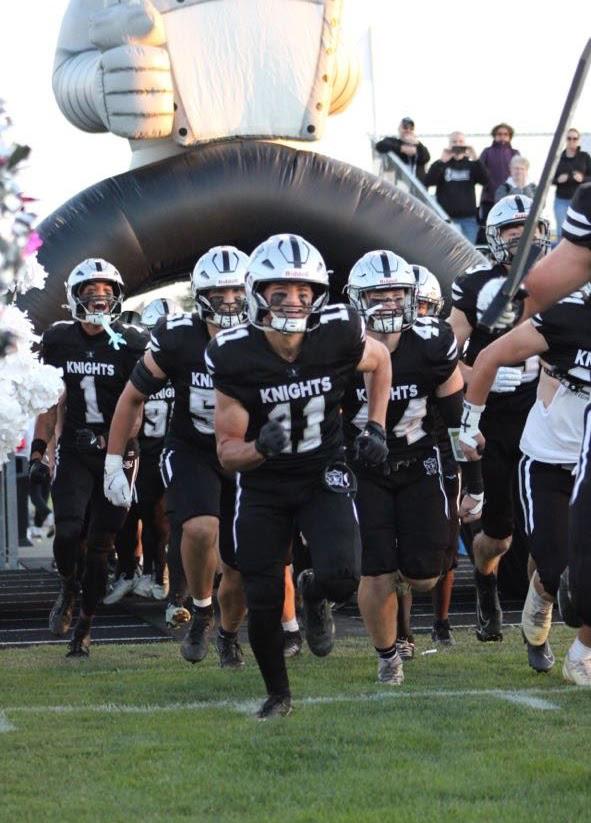



Colette Coffey
My why is my family because they’ve always motivated me during the lowest and highest of times, and they push me to take the extra mile and make myself better every single day.
My why would be goal fulfillment because everything I do is to accomplish goals I have set for myself, and I fulfill them to be a good role model for my children.
Senior Luke Pawlak
My why is to help as many people as possible and have a good time because I am only on this earth for so long.
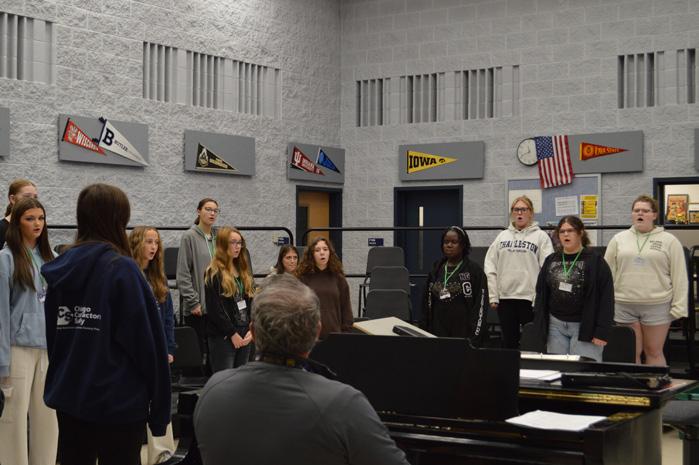

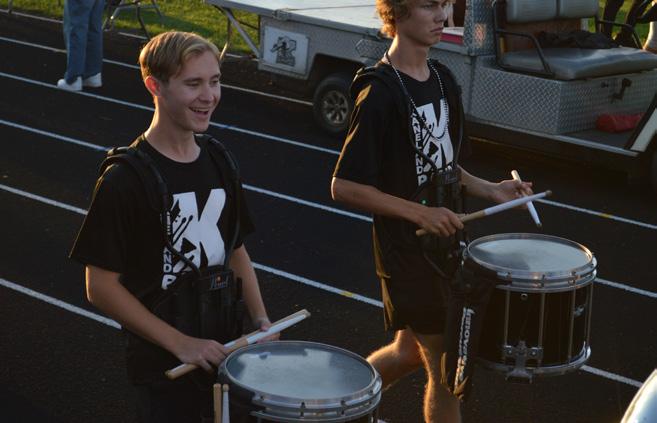



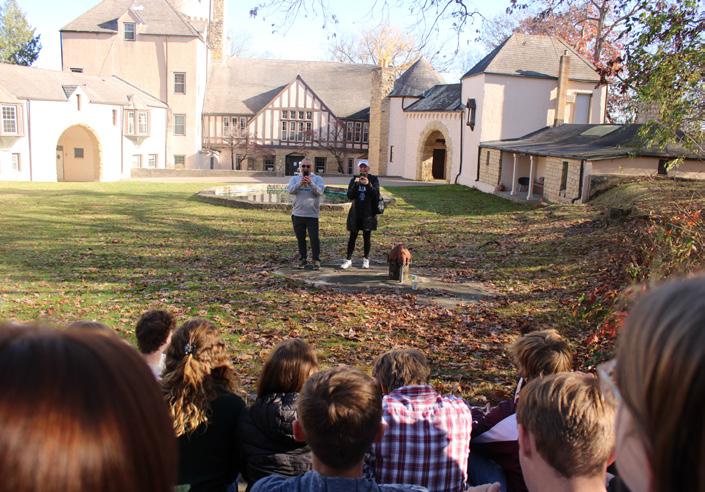
pot the Differences

The Kaneland volleyball team played Evergreen Park High School on Sept. 10. One of our Krier photographers captured the whole thing.
Can you spot the five differences between these photos?


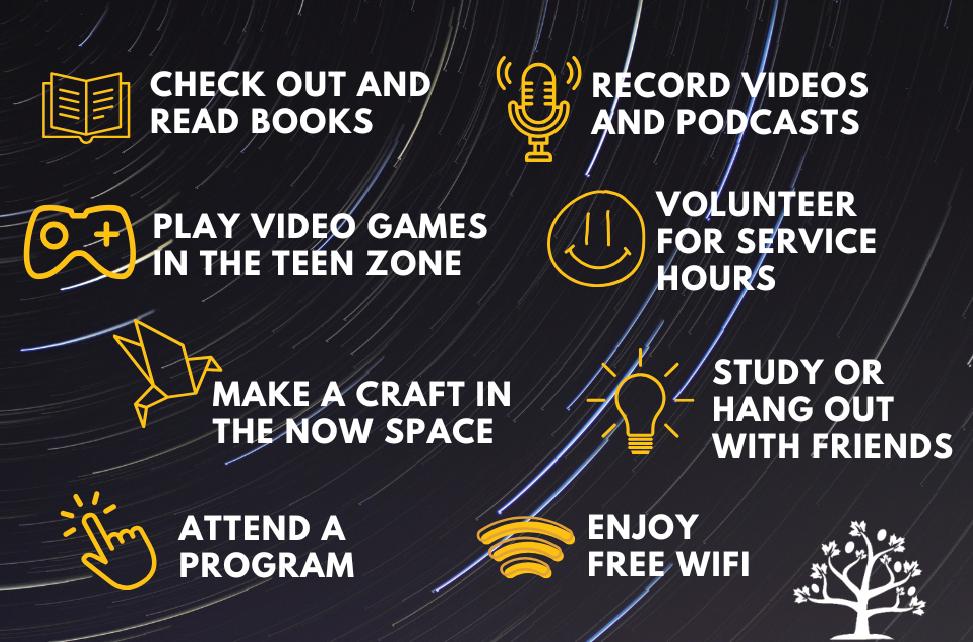












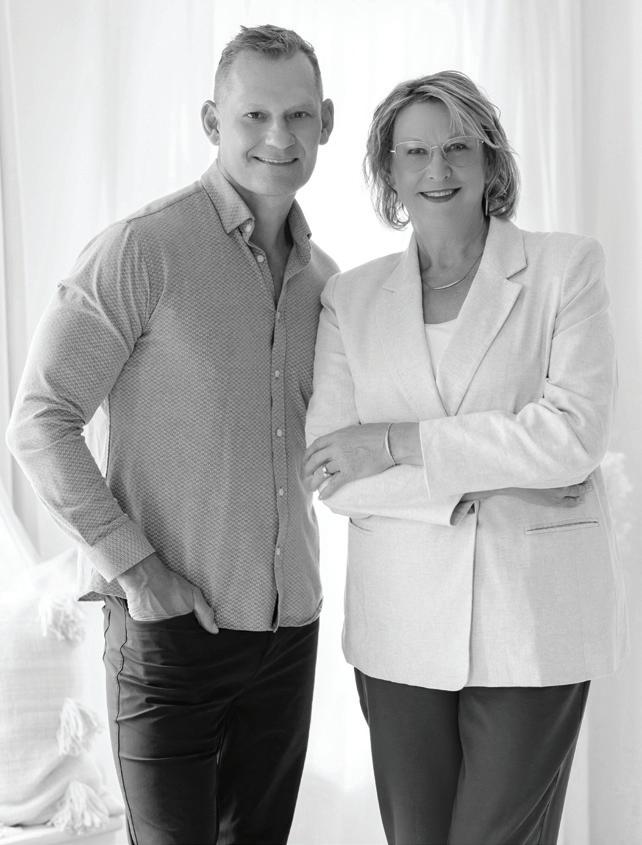





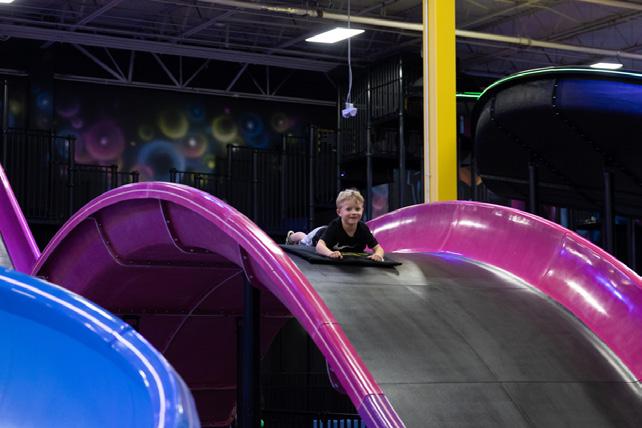








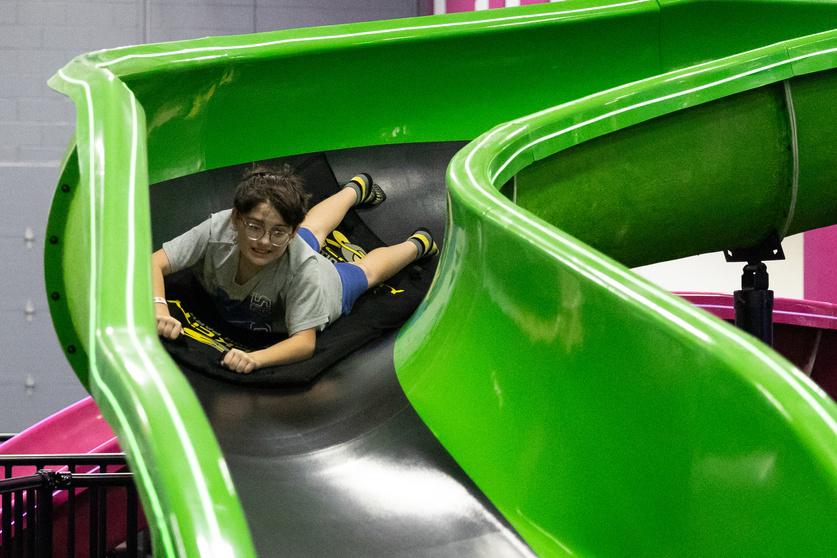
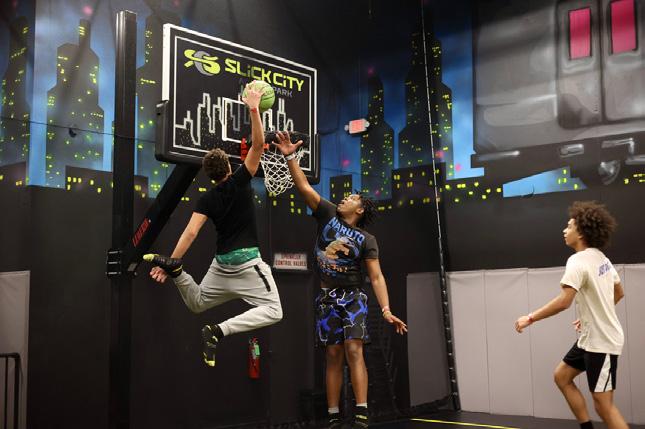










“If you really get out of your own head and apply what other people are going through, it would be easier to understand where everybody’s coming from.”
- senior Megan Fisher (page 13)

“We should just try and do one good thing a day for someone. If it’s just saying their hair looks good or you like their outfit, that can lighten up their mood if they’re having a bad day, and it creates more of a stronger community between everyone.”

- sophomore Caden Rosinski (page 16)